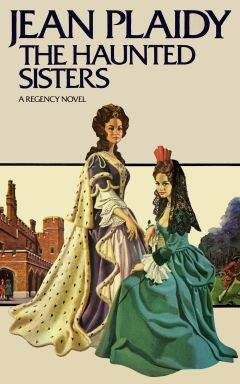Jean Plaidy - Murder Most Royal: The Story of Anne Boleyn and Catherine Howard
“And when the ghost had gone, Walter stooped down where it was...”
“Where what was?”
“The head...all dripping blood. And though the head was gone, the blood was still there. Walter touched it; he showed me the stain on his coat.”
Nurse might snort her contempt, but Catherine shivered; and there were occasions when she would dream of the headless duke, coming towards her, and his head making stains on the nursery floor.
And here at Hollingbourne there were no brothers and sisters to help her disbelief in ghosts. Ghosts came when people were alone, for all the stories Catherine had ever heard of ghosts were of people who were alone when they saw them. Ghosts had an aversion to crowds of human beings, so that, all through her life, being surrounded by brothers and sisters, Catherine had felt safe; but not since she had come to Hollingbourne.
As these thoughts set Catherine shivering, outside her window she heard a faint noise, a gentle rustling of the creeper; it was as though hands pulled at it. She listened fearfully, and then it came again.
She was sitting up in bed, staring at the window. Again there came that rustle; and with it she could hear the deep gasps of one who struggles for breath.
She shut her eyes; she covered her head with the clothes; then, peeping out and seeing a face at her window, she screamed. A voice said: “Hush!” very sternly, and Catherine thought she would die from relief, for the voice was the voice of her handsome young cousin, Thomas Culpepper.
He scrambled through the window.
“Why, ’tis Catherine Howard! I trust I did not startle you, Cousin?”
“I...thought you...to be a...ghost!”
That made him rock with merriment.
“I had forgotten this was your room, Cousin,” he lied, for well he had known it and had climbed in this way in order to impress her with his daring. “I have been out on wild adventures.” He grimaced at a jagged tear in his breeches.
“Wild adventures. . . !”
“I do bold things by night, Cousin.”
Her big eyes were round with wonder, admiring him, and Thomas Culpepper, basking in such admiration that he could find nowhere but in this simple girl cousin, felt mightily pleased that Catherine Howard had come to Hollingbourne.
“Tell me of them,” she said.
He put his fingers to his lips.
“It is better not to speak so loudly, Cousin. In this house they believe me to be but a boy. When I am out, I am a man.”
“Is it witchcraft?” asked Catherine eagerly, for often had she heard Doll Tappit speak of witchcraft.
He was silent on that point, silent and mysterious; but before he would talk to her, he would have her get off her bed to see the height of the wall which he had climbed with naught to help him but the creeper.
She got out, and naked tiptoed to the window. She was greatly impressed.
“It was a wonderful thing to do, Cousin Thomas,” she said.
He smiled, well pleased, thinking her prettier in her very white skin than in the ugly clothes she had worn on her arrival.
“I do many wonderful things,” he told her. “You will be cold, naked thus,” he said. “Get back into your bed.”
“Yes,” she said, shivering, half with cold and half with excitement. “I am cold.”
She leapt gracefully into bed, and pulled the clothes up to her chin. He sat on the bed, admiring the mud on his shoes and the unkempt appearance of his clothes.
“Do tell me,” she said, her knees at her chin, her eyes sparkling.
“I fear it is not for little girls’ ears.”
“I am not such a little girl. It is only because you are big that it seems so.”
“Ah!” he mused, well pleased to consider it in that way. “That may well be so; perhaps you are not so small. I have been having adventures, Cousin; I have been out trapping hares and shooting game!”
Her mouth was a round O of wonder.
“Did you catch many?”
“Hundreds, Cousin! More than a little girl like you could count.”
“I could count hundreds!” she protested.
“It would have taken you days to count these. Do you know that, had I been caught, I could have been hanged at Tyburn?”
“Yes,” said Catherine, who could have told him more gruesome stories of Tyburn than he could tell her, for he had never known Doll Tappit.
“But,” said Thomas, “I expect Sir John, my father, would not have allowed that to happen. And then again ’twas scarcely poaching, as it happened on my father’s land which will be one day mine, so now, Cousin Catherine, you see what adventures I have!”
“You are very brave,” said Catherine.
“Perhaps a little. I have been helping a man whose acquaintance I made. He is a very interesting man, Cousin; a poacher. So I for fun, and he for profit, poach on my father’s land.”
“Were he caught, he would hang by the neck.”
“I should intercede for him with my father.”
“I would that I were brave as you are!”
“Bah! You are just a girl...and frightened that you might see a ghost.”
“I am not now. It is only when I am alone.”
“Will you be afraid when I have gone?”
“Very much afraid,” she said.
He surveyed her in kingly fashion. She was such a little girl, and she paid such pleasant tribute to his masculine superiority. Yes, assuredly he was glad his cousin had come to Hollingbourne.
“I shall be here to protect you,” he said.
“Oh, will you? Cousin Thomas, I know not how to thank you.”
“You surely do not think I could be afraid of a ghost!”
“I know it to be impossible.”
“Then you are safe, Catherine.”
“But if, when I am alone...”
“Listen!” He put his head close to hers conspiratorially. “There”—he pointed over his shoulder—“is my room. Only one wall dividing me from you, little Cousin. I am ever alert for danger, and very lightly do I sleep. Now listen very attentively, Catherine. Should a ghost come, all you must do is tap on this wall, and depend upon it you will have me here before you can bat an eyelid. I shall sleep with my sword close at hand.”
“Oh, Thomas! You have a sword too?”
“It is my father’s, but as good as mine because one day it will be so.”
“Oh, Thomas!” Sweet was her adulation to the little braggart.
“None dare harm you when I am by,” he assured her. “Dead or living will have to deal with me.”
“You would make yourself my knight then, Thomas,” she said softly.
“You could not have a braver...”
“Oh, I know it. I do not think I shall cry very much now.”
“Why should you cry?”
“For my mother, who is dead.”
“No, Catherine, you need not cry; for in place of your mother you have your brave cousin, Thomas Culpepper.”
“Shall I then tap on the wall if...?”
He wrinkled his brows. “For tonight, yes. Tomorrow we shall find a stick for you...a good, stout stick I think; that will make a good banging on the wall, and you could, in an emergency, hit the ghost should it be necessary before I arrive.”
“Oh, no, I could not! I should die of fear. Besides, might a ghost not do terrible things to one who made so bold as to hit it?”
“That may be so. The safest plan, my cousin, is to wait for me.”
“I do not know how to thank you.”
“Thank me by putting your trust in me.”
He stood back from the bed, bowing deeply.
“Good night, Cousin.”
“Good night, dear, brave Thomas.”
He went, and she hugged her pillow in an ecstasy of delight. Never had one of her own age been so kind to her; never had she felt of such consequence.
As for ghosts, what of them! What harm could they do to Catherine Howard, with Thomas Culpepper only the other side of her bedroom wall, ready to fly to her rescue!
There was delight in the hours spent at Hollingbourne. Far away in a hazy and unhappy past were the Lambeth days; and the sweetest thing she had known was the ripening of her friendship with her cousin Thomas. Catherine, whose nature was an excessively affectionate one, asked nothing more than that she should be allowed to love him. Her affection he most graciously accepted, and returned it in some smaller measure. It was a happy friendship, and he grew more fond of her than his dignity would allow him to make known; she, so sweet already, though so young, so clingingly feminine, touched something in his manhood. He found great pleasure in protecting her, and thus love grew between them. He taught her to ride, to climb trees, to share his adventures, though he never took her out at night; nor did he himself adventure much this way after her coming, wishing to be at hand lest in the lonely hours of evening she might need his help.
Her education was neglected. Sir John did not believe overmuch in the education of girls; and who was she but a dependant, though the child of his sister! She was a girl, and doubtless a match would be made for her; and bearing such a name as Howard, that match could be made without the unnecessary adornment of a good education. Consider the case of his kinsman, Thomas Boleyn. He had been, so Sir John had heard, at great pains to educate his two younger children who, in the family, had acquired the reputation of possessing some brilliance. Even the girl had been educated, and what had education done for her? There was some talk of a disaster at court; the girl had aspired to marry herself to a very highly born nobleman—doubtless due to her education. And had her education helped her? Not at all! Banishment and disgrace had been her lot. Let girls remain docile; let them cultivate charming manners; let them learn how to dress themselves prettily and submit to their husbands. That was all a girl needed from life. And did she want to construe Latin verse to do these things; did she want to give voice to her frivolous thoughts in six different languages! No, the education of young Catherine Howard was well taken care of.
Thomas tried to teach his cousin a little, but he quickly gave up the idea. She had no aptitude for it; rather she preferred to listen to the tales of his imaginary adventures, to sing and dance and play musical instruments. She was a frivolous little creature, and having been born into poverty, well pleased to have stepped out of it, happy to have for her friend surely the most handsome and the dearest cousin in the world. What more could she want?
And so the days passed pleasantly—riding with Thomas, listening to Thomas’s stories, admiring him, playing games in which he took the glorious part of knight and rescuer, she the role of helpless lady and rescued; now and then taking a lesson at the virginals, which was not like a lesson at all because she had been born with a love of music; she had singing lessons too which she loved, for her voice was pretty and promised to be good. But life could not go on in this even tenor for ever. A young man such as Thomas Culpepper could not be left to the care of a private tutor indefinitely.
He came to the music room one day while Catherine sat over the virginals with her teacher, and threw himself into a window seat and watched her as she played. Her auburn hair fell about her flushed face; she was very young, but there was always in Catherine Howard, even when a baby, a certain womanliness. Now she was aware of Thomas there, she was playing with especial pains to please him. That, thought Thomas, was so typical of her; she would always care deeply about pleasing those she loved. He was going to miss her very much; he found that watching her brought a foolish lump into his throat, and he contemplated running from the room for fear his sentimental tears should betray him. It was really but a short time ago that she had come to Hollingbourne, and yet she had made a marked difference to his life. Strange it was that that should be so; she was meek and self-effacing, and yet her very wish to please made her important to him; and he, who had longed for this childish stage of his education to be completed, was now sorry that it was over.
The teacher had stood up; the lesson was ended.
Catherine turned a flushed face to her cousin.
“Thomas, do you think I have improved?”
“Indeed yes,” he said, realizing that he had hardly heard what she had played. “Catherine,” he said quickly, “let us ride together. There is something I would say to you.”
They galloped round the paddock, he leading, she trying to catch up but never succeeding—which made her so enchanting. She was the perfect female, forever stressing her subservience to the male, soft and helpless, meek, her eyes ever ready to fill with tears at a rebuke.
He pulled up his horse, but did not dismount; he dared not, because he felt so ridiculously near tears himself. He must therefore be ready to whip up his horse if this inclination became a real danger.
“Catherine,” he said, his voice hardly steady, “I have bad news....”
He glanced at her face, at the hazel eyes wide now with fear, at the little round mouth which quivered.
“Oh, sweet little Cousin,” he said, “it is not so bad. I shall come back; I shall come back very soon.”
“You are going away then, Thomas?”
The world was suddenly dark; tears came to her eyes and brimmed over. He looked away, and sought refuge in hardening his voice.
“Come, Catherine, do not be so foolish. You surely did not imagine that my father’s son could spend all his days tucked away here in the country!”
“No...no.”
“Well then! Dry your eyes. No handkerchief? How like you, Catherine!” He threw her his. “You may keep that,” he said, “and think of me when I am gone.”
She took the handkerchief as though already it were a sacred thing.
He went on, his voice shaking: “And you must give me one of yours, Catherine, that I may keep it.”
She wiped her eyes.
He said tenderly: “It is only for a little while, Catherine.”
Now she was smiling.
“I should have known,” she said. “Of course you will go away.”
“When I return we shall have very many pleasant days together, Catherine.”
“Yes, Thomas.” Being Catherine, she could think of the reunion rather than the parting, even now.
He slipped off his horse, and she immediately did likewise; he held out his hands, and she put hers into them.
“Catherine, do you ever think of when we are grown up...really grown up, not just pretending to be?”
“I do not know, Thomas. I think perhaps I may have.”
“When we are grown up, Catherine, we shall marry...both of us. Catherine. I may marry you when I am of age.”
“Thomas! Would you?”
“I might,” he said.
She was pretty, with the smile breaking through her tears.
“Yes,” he said, “I think mayhap I will. And now, Catherine, you will not mind so much that I must go away, for you must know, we are both young in actual fact. Were we not, I would marry you now and take you with me.”
They were still holding hands, smiling at each other; he, flushed with pleasure at his beneficence in offering her such a glorious prospect as marriage with him; she, overwhelmed by the honor he did her.
He said: “When people are affianced, Catherine, they kiss. I am going to kiss you now.”
He kissed her on either cheek and then her soft baby mouth. Catherine wished he would go on kissing her, but he did not, not over-much liking the operation and considering it a necessary but rather humiliating formality; besides, he feared that there might be those to witness this and do what he dreaded most that people would do, laugh at him.




